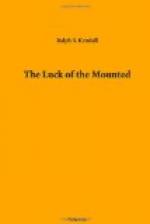“Here cometh Moran’s ‘dep’ty sheriff,’” was Yorke’s facetious comment.
“By gum, though!” Redmond ejaculated, “the beggar would make a good stage marshal, wouldn’t he? . . . with that Bret Harte, forty-niner’s moustache and undertaker’s mug, and top-boots and all, what?”
“And a glittering star badge,” supplemented Yorke dramatically, “don’t forget that! and two murderous-looking guns slanted across his hips and—”
“Arrah, thin! shut up, Yorkey!” hissed the sergeant in a warning aside, “they’ll hear yez. Here they come.”
Presently the five were grouped together. Inspector Kilbride’s stern features were set in a thoughtful, lowering scowl. Mr. Gully’s tanned, leathery countenance looked curiously mottled.
“Sergeant!” The inspector clicked off his words sharply. “This is a bad case. We’ve just been viewing the body—Mr. Gully and I.” With mechanical caution he glanced swiftly round. “Let’s get inside and go over things again,” he added.
Seated in the privacy of the hotel parlour the crime was discussed from every angle with callous, professional interest. Kilbride and Slavin did most of the talking, though occasionally Gully interpolated with question and comment. He possessed a deep, booming bass voice well-suited to his vast frame. His speech, despite a slightly languid drawl, was unquestionably that of an educated Englishman. Yorke and Redmond maintained a respectful silence in the presence of their officer, except to answer promptly and quietly any questions put directly to them.
Personal revenge they decided eventually could be the only motive. Robbery was out of the question, as the personal belongings of the dead man had been found to be intact, including a valuable diamond ring, about a hundred and fifty dollars in bills, and his watch, papers, etc. A jovial, light-hearted young rancher, hailing originally from the Old Country, a bachelor of more or less convivial habits, he had enjoyed the hearty good-will of the country-side, incurring the enmity of no one, with the exception of Moran, as far as they knew. The latter’s alibi having established his innocence beyond doubt, no definite clues were forthcoming as yet, beyond the foot-prints, the horse, and the “Luger” shell. Moran, too, they ascertained had ridden in alone, and was not in the habit of chumming with anyone in particular. Slavin had prepared a list of all known out-going and incoming individuals on and about the date of the crime. This was carefully conned over. All were, without exception, well-known respectable ranchers, and citizens of Cow Run, to whom no suspicion could be attached.
“No!” commented the inspector wearily, at length. “In my opinion this has been done by someone living right here in this burg—a man whom we could go and put our hands on this very minute—if we only had something to work on. You’ll see . . . it’ll turn out to be that later. Just about the last man you’d suspect, either. Cases like this—where the individual has nerve enough to stay right on the job and go about his business as usual—are often the hardest nuts to crack. You remember that Huggard case, Sergeant?”




